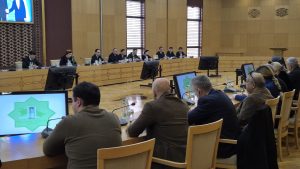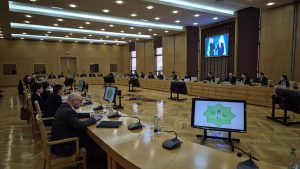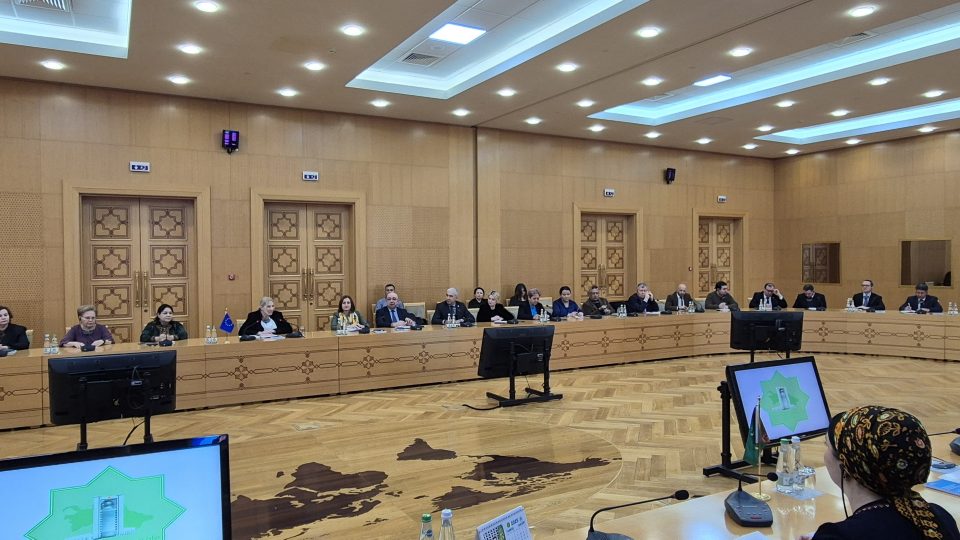On 24 January, the European Union Delegation to Turkmenistan and the Ministry of Foreign Affairs of Turkmenistan held a joint press conference to reflect on the their partnership in 2024 and to outline strategic priorities for the year ahead. The event brought together local and international media, representatives from Turkmen ministries and agencies, and coordinators of EU-funded projects, showcasing the strong collaboration between the EU and Turkmenistan.
H.E. Ms. Beata Peksa, Ambassador of the European Union to Turkmenistan, expressed her gratitude to the Ministry of Foreign Affairs of Turkmenistan, other ministries and agencies, as well as EU-funded projects for their fruitful cooperation and contribution to the successful implementation of joint initiatives that have strengthened the EU-Turkmenistan partnership and advanced shared goals in sustainable development, regional connectivity, and inclusive growth. She highlighted the significant progress made in 2024 across key areas such as transport connectivity, green energy, trade facilitation, human rights, and cultural exchanges. She emphasized the EU’s commitment to deepening cooperation with Turkmenistan in the coming years, focusing on shared priorities that align with Turkmenistan’s development goals.
Ms. Myahri Byashimova, Deputy Foreign Minister of Turkmenistan, expressed her gratitude for the EU’s continued support and reaffirmed Turkmenistan’s commitment to strengthening bilateral ties. She acknowledged the positive impact of EU-funded projects on the country’s development and highlighted the importance of this partnership for Turkmenistan’s future. Ms. Byashimova also listed major achievements of the partnership, including progress in transport connectivity, green energy initiatives, trade facilitation.
A Year of Achievements
2024 was a landmark year for EU-Turkmenistan cooperation. One of the most notable achievements was the progress made in developing the Trans-Caspian Transport Corridor, a key priority for both parties. The EU supported the modernization of the Turkmenbashi-Turkmenabat Railway, the implementation of the Electronic Consignment Note (e-CMR) System, and the establishment of a Logistics Centre near the border with Kazakhstan. These initiatives, part of the EU’s Global Gateway strategy, aim to boost regional trade and improve logistics efficiency.
In the field of green energy and climate action, the EU launched the “EU for a Green Turkmenistan” initiative, which included pilot projects to reduce methane emissions and treat drainage water using algae-based technology. Over 150 government officials and industry stakeholders were trained, and major events like the National Youth Conference on Climate Change in Mary underscored the importance of youth engagement in environmental issues.
Trade facilitation and support for small and medium-sized enterprises (SMEs) also saw significant progress. The International Trade Centre (ITC) project supported Turkmenistan’s WTO accession by translating 39 legislative acts and training 300 SMEs on trade facilitation and e-commerce. Meanwhile, the European Bank for Reconstruction and Development (EBRD) facilitated access to finance for over 120 businesses, 30% of which were women-led, and provided tailored advisory services to 199 enterprises.
In the area of human rights, the 16th EU-Turkmenistan Human Rights Dialogue in June 2024 highlighted Turkmenistan’s progress in eradicating statelessness, forced labor, and human trafficking. The EU offered support for reforms in the judicial and prison systems, and for the promotion of gender equality and the rights of persons with disabilities..
Cultural and educational exchanges were further developed, with over 120 students and academic staff benefiting from the Erasmus+ Programme. Cultural events like the Baroque-Bagshy tour and Francophonie celebrations brought European and Turkmen traditions closer together, fostering mutual understanding and strengthening ties.


Looking ahead to 2025
As the partnership moves into 2025, the EU and Turkmenistan are focused on deepening cooperation in several key areas:
Transport and connectivity: The EU will continue to support the development of the Trans-Caspian Transport Corridor, with a focus on enhancing regional trade and logistics efficiency. The EU Commissioner for International Partnerships, Jozef Sikela, is scheduled to visit Turkmenistan in March 2025 to discuss concrete steps in further cooperation.
Green energy and climate action: The EU will expand its support for renewable energy projects and climate adaptation measures, including the implementation of the Team Europe Initiative (TEI) for Climate, Energy, and Water.
Trade and investment: The EU will continue to assist Turkmenistan’s WTO accession and strengthen trade facilitation through initiatives like Prosperity in Central Asia programme. The Prosperity Cluster will focus on trade and investment in key sectors, including critical raw materials.
Institutional strengthening: The EU will support Turkmenistan’s efforts to strengthen governance, combat corruption, reforms of the judicial and prisons systems and promote human rights.
Inclusive societal development: The EU will support initiatives to empower women, address climate challenges, and promote youth engagement. The EU-CA Women-Leaders Forum in Ashgabat in April 2025 will highlight the role of women in leadership and development. A new regional Civil Society Organization (CSO) project will enhance youth involvement and strengthen regional networking among CSOs. The EU is also committed to supporting local CSOs through grants aimed i.a. at empowering women, addressing climate challenges, and supporting youth initiatives.
Upcoming events in 2025
The year ahead will be marked by several high-level events:
- The 8th Interparliamentary Meeting in Ashgabat in February 2025.
- The EU-Central Asia Ministerial Meeting in Ashgabat in March 2025.
- The EU-Central Asia Summit in Samarkand in April 2025.
- The EU-Central Asia Women-Leaders Forum in Ashgabat in April 2025.
The EU-Turkmenistan partnership has achieved several milestones in 2024, laying a solid foundation for future collaboration. As both parties look ahead to 2025, they remain committed to deepening their cooperation in areas of mutual interest, from transport connectivity and green energy to trade facilitation and human rights. Together, the EU and Turkmenistan aim to continue their shared endeavours, contributing to sustainable development and regional stability.

